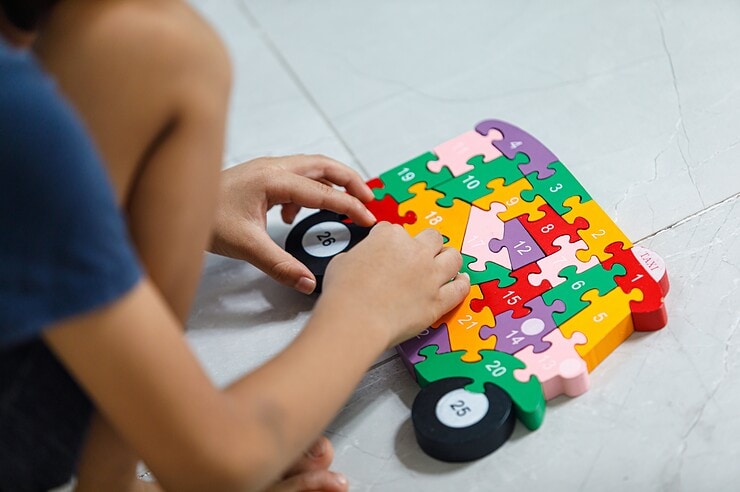When helping your child hurts their progress
Despite good intentions, unsolicited help can be discouraging to children

When parents see their children struggle, their first instinct is often to step in and offer a helping hand. My 3-year-old daughter loves jigsaw puzzles, but sometimes gets frustrated when trying to solve them. I’ll point to a particular piece — “Maybe this one?” I say, knowing full well that it fits.
Help isn’t always beneficial for children
A recent study suggests that giving children such unsolicited help, even in the form of a hint, can actually backfire. In three experiments, children working on a task received a suggestion, the correct answer outright, or no help. Children who received a suggestion or the correct answer felt less competent, enjoyed the task less, and sought fewer challenges than those who received no help.
“It’s counterintuitive that helping has these unintended consequences,” says study author Jellie Sierksma, Assistant Professor in the Department of Developmental Psychology at Utrecht University. “I find it fascinating that just offering help communicates all these things to kids, and it can really impact them on many levels.”
The results challenge conventional wisdom in psychological theory, parenting, and education, that indirect help in the form of hints or guidance is always beneficial for children. Overall, the study provides an important basis to rethink how adults could help in a way that is empowering, rather than discouraging.
“I think it’s really important that kids struggle. Our inclination is to think kids suffer when they struggle, but actually the opposite might also be true,” she says. “It makes them feel competent when we don’t interfere because it communicates that we believe they can finish the puzzle by themselves.”
“I think it’s really important that kids struggle.”
Jellie Sierksma
Sierksma’s work has previously investigated how children’s helping can promote negative views of themselves or others, perpetuate inequality, and hamper learning. For instance, in her 2023 study, children did not help their peers equally, which may perpetuate achievement gaps. Children provided the least beneficial help to peers who struggled with a task, and the most beneficial help to peers who were already good at that task.
The recent study, in collaboration with Eddie Brummelman, Associate Professor at the University of Amsterdam, examined the psychological consequences of receiving unsolicited help in middle childhood.
A total of 619 children aged 7 to 9 were given six block-based puzzles. Regardless of their performance, children were randomly informed that the researcher believed they needed the correct answer, a hint, or no help. Then, they were given a seventh puzzle to solve with the correct answer, a hint, or no help accordingly.
Afterwards, the children were asked how good they are at the block test, how much they like the block test, and how much help they think they need on the test. They answered on a scale of 1 for not at all/none to 6 for a lot. A subset of children were given the choice of 4 more easy or difficult puzzles, measuring their challenge seeking and motivation for the task.
“Receiving unsolicited help seemed to undermine children’s perceptions of their own ability, and caused them to believe they needed more help.”
Receiving unsolicited help seemed to undermine children’s perceptions of their own ability, and caused them to believe they needed more help. Children who were given either type of help said they were less good at the test than those who were given no help, with no significant difference between the two types of help. And children who were given the correct answer liked the task less than those who had no help.
In addition, children who received help in either form believed they needed more help than the no-help group. Lastly, the children who had been given help sought fewer difficult puzzles than those who received no help.
“Across the board, both hints and correct answers had a negative impact on kids,” says Sierksma. “Getting help they didn’t ask for might thwart children’s feelings of autonomy and competence — and it doesn’t matter what kind of help it is.”
Give children the space to find their own solutions
Despite good intentions, unsolicited help could lead children to denigrate their ability and lose motivation. The results are consistent with self-determination theory in psychology, which states that intrinsic motivation is experienced as autonomous and self-determined.
“Despite good intentions, unsolicited help could lead children to denigrate their ability and lose motivation.”
Educators often give more unsolicited help to students who belong to intellectually stigmatized groups, such as students from low socioeconomic or immigrant backgrounds. Such unequal help may inadvertently perpetuate existing inequalities by lowering these students’ perceptions of their ability.
For parents like me, we can try giving our kids the space to work through problems and learn how to find solutions on their own. Sierksma, a mother of two young children, reminds herself to pause and take a breath whenever she feels the urge to help without being asked.
“I have learned that I need to let them struggle, giving them time to figure things out by themselves,” she says. “It might be better if we build on children’s skills of asking for help and lean on that. So, don’t step in. Let’s see if we can teach them when they should ask us.”
